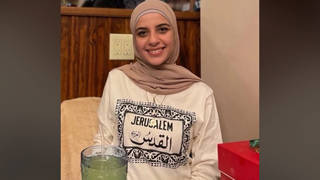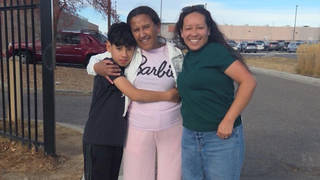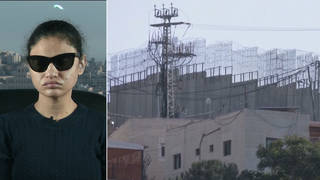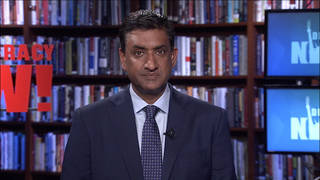This content originally appeared on Democracy Now! and was authored by Democracy Now!.
This post was originally published on Radio Free.
This content originally appeared on Democracy Now! and was authored by Democracy Now!.
This post was originally published on Radio Free.
This content originally appeared on Democracy Now! and was authored by Democracy Now!.
This post was originally published on Radio Free.
This content originally appeared on Democracy Now! and was authored by Democracy Now!.
This post was originally published on Radio Free.
This content originally appeared on Democracy Now! and was authored by Democracy Now!.
This post was originally published on Radio Free.
This content originally appeared on Democracy Now! and was authored by Democracy Now!.
This post was originally published on Radio Free.
This content originally appeared on Democracy Now! and was authored by Democracy Now!.
This post was originally published on Radio Free.

Calls are growing to release Palestinian protester Leqaa Kordia, who was arrested at a 2024 Columbia University Gaza solidarity protest. The charges were dismissed, but when she went to her ICE check-in this past March, she was arrested and immediately sent to the Prairieland Detention Center in Alvarado, Texas, where she has been held ever since. Although Columbia University student protesters like Mohsen Mahdawi and Mahmoud Khalil have been freed from ICE detention, “her case sort of fell between the cracks,” says Laila El-Haddad, Palestinian writer and journalist from Gaza, who just visited Kordia. El-Haddad also criticizes the Trump administration’s effort to “crack down on any dissent and use immigration law, to weaponize immigration law to silence dissent and to criminalize free speech, especially when that speech relates to Palestine.”
This content originally appeared on Democracy Now! and was authored by Democracy Now!.
This post was originally published on Radio Free.

Democracy Now! speaks with longtime immigrant rights activist Jeanette Vizguerra, who was just released Monday from ICE jail after nearly 10 months in a Colorado detention center. Vizguerra was ambushed by ICE agents during her work break in March. A judge ordered her detention was unconstitutional, and she was released on bond Monday. Vizguerra describes her time in detention and says she is “very emotional” and glad to be reunited with her children, and plans to keep fighting for her rights and for others. “Her detention was intentional to try and silence people across the country, not only immigrant leaders, but also citizens,” says Jennifer Piper, a supporter and program director for American Friends Service Committee Colorado.
This content originally appeared on Democracy Now! and was authored by Democracy Now!.
This post was originally published on Radio Free.

As the DOJ releases the largest batch of files yet on the federal investigation into Epstein, we look at some of the most significant revelations with investigative journalist Vicky Ward, who has spent decades reporting on the deceased sexual predator, his powerful associates and the impact of his crimes. Survivors have condemned the Department of Justice for not complying with the Epstein Files Transparency Act, which required all files to be released last Friday. “I mean, that was the first indication of the contemptuous, cavalier attitude that has gone on inside this Justice Department,” says Ward. “It’s heartbreaking, frankly, to see these files being dribbled out.”
This content originally appeared on Democracy Now! and was authored by Democracy Now!.
This post was originally published on Radio Free.
Democracy Now! Wednesday, December 24, 2025
This content originally appeared on Democracy Now! Audio and was authored by Democracy Now!.
This post was originally published on Radio Free.
Democracy Now! Wednesday, December 24, 2025
This content originally appeared on Democracy Now! Audio and was authored by Democracy Now!.
This post was originally published on Radio Free.
This content originally appeared on Democracy Now! and was authored by Democracy Now!.
This post was originally published on Radio Free.
This content originally appeared on Democracy Now! for Broadcasters – HD MP4 and was authored by Democracy Now! for Broadcasters – HD MP4.
This post was originally published on Radio Free.
This content originally appeared on Democracy Now! and was authored by Democracy Now!.
This post was originally published on Radio Free.
This content originally appeared on Democracy Now! and was authored by Democracy Now!.
This post was originally published on Radio Free.
This content originally appeared on Democracy Now! and was authored by Democracy Now!.
This post was originally published on Radio Free.
This content originally appeared on Democracy Now! and was authored by Democracy Now!.
This post was originally published on Radio Free.
This content originally appeared on Democracy Now! and was authored by Democracy Now!.
This post was originally published on Radio Free.
This content originally appeared on Democracy Now! and was authored by Democracy Now!.
This post was originally published on Radio Free.
This content originally appeared on Democracy Now! and was authored by Democracy Now!.
This post was originally published on Radio Free.
This content originally appeared on Democracy Now! and was authored by Democracy Now!.
This post was originally published on Radio Free.
This content originally appeared on Democracy Now! and was authored by Democracy Now!.
This post was originally published on Radio Free.
This content originally appeared on Democracy Now! and was authored by Democracy Now!.
This post was originally published on Radio Free.
This content originally appeared on Democracy Now! and was authored by Democracy Now!.
This post was originally published on Radio Free.

There’s been a sharp rise of illegal settlements in the occupied West Bank under Israel’s current far-right government. Israel’s Cabinet approved a proposal for the construction of 19 new Israeli settlements in the occupied West Bank on Sunday. Amnesty International researcher Budour Hassan says the move “entrenches the apartheid system we’re seeing in the West Bank.” Experts warn that the settlements further threaten the possibility of creating a Palestinian state.
This content originally appeared on Democracy Now! and was authored by Democracy Now!.
This post was originally published on Radio Free.

There’s been a sharp rise of illegal settlements in the occupied West Bank under Israel’s current far-right government. Israel’s Cabinet approved a proposal for the construction of 19 new Israeli settlements in the occupied West Bank on Sunday. Amnesty International researcher Budour Hassan says the move “entrenches the apartheid system we’re seeing in the West Bank.” Experts warn that the settlements further threaten the possibility of creating a Palestinian state.
This content originally appeared on Democracy Now! and was authored by Democracy Now!.
This post was originally published on Radio Free.

Democracy Now! speaks with Democratic Congressmember Ro Khanna on the latest developments in Congress and about escalating U.S. attacks on alleged drug boats off the coast of Venezuela. “Why are we going into a regime change war when the president promised no endless wars?” he asks.
Khanna also defends New York City Mayor-elect Zohran Mamdani after Congress passed a resolution condemning the “horrors of socialism.” “I call myself a progressive capitalist, but democratic socialism does not mean that you’re going to seize the means of production,” Khanna says. “What they’re talking about is taxing billionaires more, which I agree with.”
This content originally appeared on Democracy Now! and was authored by Democracy Now!.
This post was originally published on Radio Free.